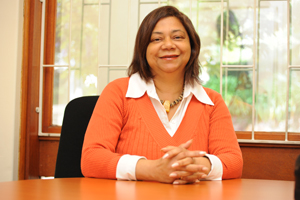Transformation office gears up to transform campus
04 April 2011 Geared for change: The Director of the Transformation Services Office, Glenda Wildschut.(View the video here)
Geared for change: The Director of the Transformation Services Office, Glenda Wildschut.(View the video here)
Transformation Month, held campus-wide during March, has created the impetus for similar events and activities that will help the Transformation Services Office (TSO) intensify and advance UCT's transformation agenda, says TSO director Glenda Wildschut.
While it is difficult to assess the impact of Transformation Month, the programme was generally well-received, particularly the fun student activities. "One of the student events, the open forum dialogue on White Fears, Black Rights attracted more than 200 participants. This was, in my opinion, a really authentic discussion on race and diversity," says Wildschut.
"Those who experienced Transformation Month found the diversity of the programmes interesting, especially the mixture of artistic forms, and the way dialogue was facilitated by different methodologies - such as the round table discussion on tobacco control and human rights, and expert inputs by the UN rapporteur on disabilities."
Wildschut's interest in transformation stems from her involvement in structures and forums in the early 1990s, which paved the way for national transformation via the Transitional Executive Council, the Sub-Council on Defence and the Truth and Reconciliation Commission. "I feel that it is my duty as a citizen, and an honour, to be involved in transformation." Transformation, she adds, will take time and patience and a lot of hard work - both at a personal and a collective level."
Wildschut and the TSO have been hard at work on the roll-out of the ADAPT programme that will facilitate transformation across campus. "ADAPT is aligned with the vision and mission of the TSO to foster an institutional climate that values diversity and fosters inclusivity. The content was refined and embellished upon to meet the demands of a post-Khulma era at UCT," she explains.
The first "train-the-trainer' phase of the ADAPT programme was recently completed. Twenty-three advisors are now skilled in several aspects of transformation facilitation. "Participants will become part of a process that supports UCT's mission in a structured and methodical way and will be in a position to champion the creation of a campus culture in which diversity is understood and valued, and in which emotional intelligence is promoted."
ADAPT is based on the same peer-education/peer-counselling premise as DISCHO's Anti-Discrimination Advisors (ADAs) programme, which trains group of peers who in turn can educate their colleagues in a structured, contained way and also refer people to the appropriate services when necessary.
"The immediate benefit of this type of programme is that ADAPT advisors/counsellors will become mentors who will have a positive influence on the attitude and behaviour of their colleagues. They will also impart knowledge and skills which will cascade further into the community as participants share information and ideas with others," explains Wildschut.
"At the core of the ADAPT programme is the notion of better understanding of our differences and similarities, as well as that of furthering the corresponding understanding of our own responses when we are confronted by attitudes and behaviours different from our own."
The trainers include departmental heads, residence staff, scientific and technical officers, clinical psychologists, a social worker, lecturers, a nurse, administrators and others representing many facets of university life. They have all expressed their full commitment to the transformation of UCT and are eager to contribute to positive change on campus.
The second "reflective practice" phase of the programme will see the ADAPT trainees work in teams to hold workshops with the University Transformation Committees during June until August. The third phase will start with a pivotal planning workshop for all HoDs and Line Managers in order to strategise and plan the final roll-out of the programme to the rest of the university - this is expected to begin in October.
"We believe that ADAPT will prove to be an invaluable catalyst for change that will improve participants' intercultural competencies and leadership skills, which will in turn contribute to the longer-term leadership and strategic goals."
 This work is licensed under a Creative Commons Attribution-NoDerivatives 4.0 International License.
This work is licensed under a Creative Commons Attribution-NoDerivatives 4.0 International License.
Please view the republishing articles page for more information.







